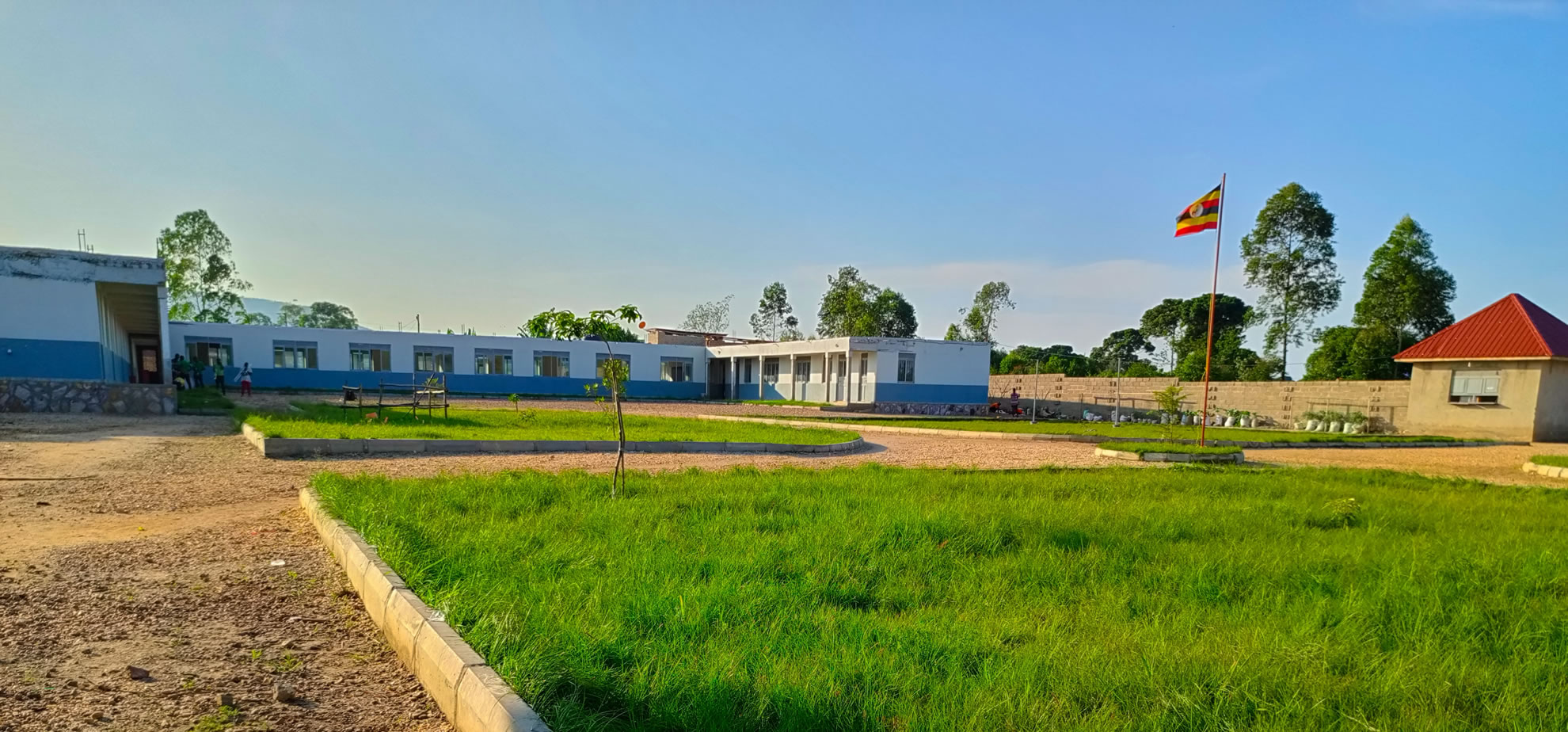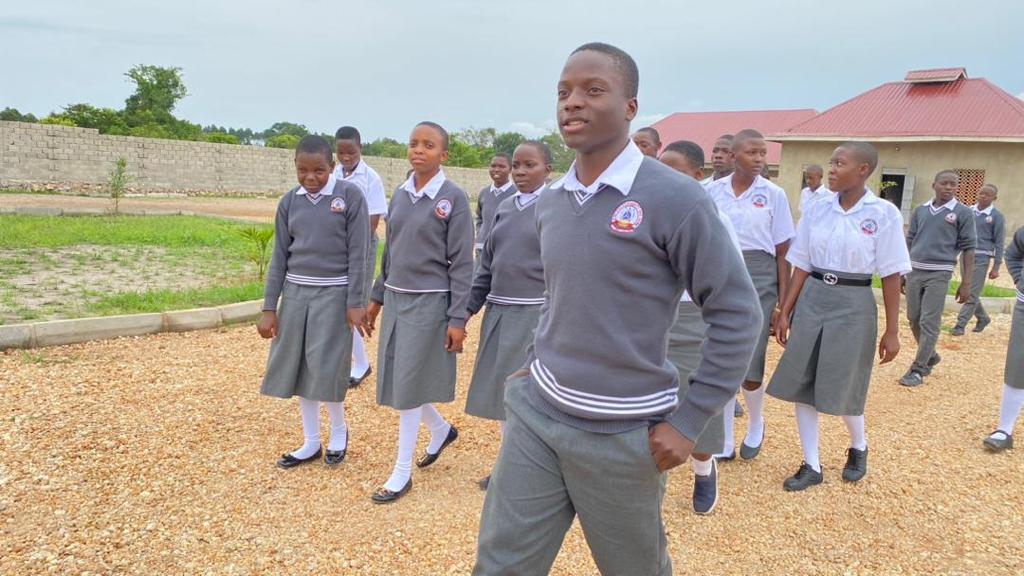On the morning of January 15, 2023, hundreds of Kasasa community members gathered to celebrate the opening of Tat Sat Kasasa Secondary School or TaSKA, a much-needed institution in Uganda’s Kyotera District.
The school, now complete, welcomed its first group of students on February 6, 2023 marking a significant achievement in a rural area where secondary education is often out of reach— the nearest school is 10 kilometers away. This distance has historically discouraged many students, especially girls, leading to high dropout rates and early marriages.
Before TaSKA, few girls made it beyond primary school, as they had to endure long, dangerous walks to the nearest secondary school. “Our female children and other secondary school students had to walk long distances, which was dangerous,” said Charles Mukasa, a teacher and director of administration in Kasasa.
So, in 2018, the community took action, launching an initiative to build a secondary school that is accessible, affordable, and inclusive, aiming to keep more children, especially girls, in school.
For locals, by locals
Partnering with Peace Africa Children Ensemble or PACE, the community approached Interoots, a U.S.-based nonprofit that works with communities through appointed liaisons to implement local projects.
Unlike traditional nonprofits, Interoots follows a “non-colonial philanthropy” model, where communities design and lead their projects. Interoots provides microgrants to fund these efforts but remains hands-off once the projects are self-sustaining.
For the school project, The TaSCA Kasasa Community Board or TKCB, a group of elected individuals from the community, oversaw the project, making all key decisions while Interoots acted as a funding partner.
The community raised funds through partnerships and local contributions, including donated land. “The project’s success isn’t solely reliant on external funding. Community efforts have kept it going since 2019,” said Felix Ayaniko, chairman of the Institute for Indigenous Culture and Performing Arts or ICPA. Ronald Mubirigwe, a community member, echoed this sentiment, noting that the project is fueled by collective efforts from the community.
As of March, TaSKA is serving 120 students, with 64 of them being girls, reflecting the project’s commitment to equal access. Of the total student population, 57 are boarders, primarily from neighboring communities and remote areas of the Kasasa municipality, while 63 are day students from central Kasasa.

The school is staffed by 23 teachers, five non-teaching staff, and three support personnel, maintaining a teacher-to-student ratio of 1:20. There is ample capacity for new enrollments, which happen daily. All students receive meals, primary medical care, extracurricular activities, and access to financial services, ensuring a holistic educational experience.
The TaSCA school project is more than just a school. It integrates secondary education with arts and skill-based training while addressing cultural preservation and financial sustainability. The initiative stands on three pillars: formal education, a cultural performing arts center, and a community credit union.
The community credit scheme named Savings and Credit Cooperative Organization or SACCO provides financial support for families, ensuring that education remains accessible. “The school even has a maize mill, where locals can sell grain and, in return, afford to pay their children’s fees,” Mubirigwe added, emphasizing the project’s holistic approach to community empowerment.
A chance at education
Education is a powerful tool in reducing child marriage, and in Uganda, the challenge is stark. According to UNICEF, girls with secondary education are far less likely to marry as children compared to those with little or no schooling. Yet, a Gender Data analysis shows that only 26% of students—25% of females and 27% of males—complete secondary education in Uganda, highlighting a major gap in access.
In Kasasa, the newly established secondary school is already making strides to change this. By providing local access to education, the community is working to break the cycle of dropouts and early marriages. “We’re so happy that our girls now have the chance to go to school and are treated equally to boys,” said Agnes Namiaga, a local resident. “Before, secondary schools were too far and too expensive, but with one nearby, we have hope for their future.”
The school has also brought employment opportunities for locals, employing both professional and support staff from the community. “Now, many parents can work at the school and afford to send their children there,” Namiaga added.
Not yet uhuru
Despite the school’s progress, there are still challenges. As of the second year, enrollment numbers stood at just 175 students—far below the school’s capacity. “Even though the fees are low and affordable, many families are still just realizing the importance of education,” said Mubirigwe. “We’re working on raising more awareness, but it’s a slow process.”
The community remains hopeful. “There is more awareness now, and the attitude toward education is changing,” Mubirigwe noted. “It’s positive, but we still have work to do.”
As Kasasa continues to confront the challenges of rural education, the community-led school project stands as a powerful symbol of what can be achieved through collaboration and perseverance. For the children of Kasasa, especially the girls, the future now seems brighter than ever.
“We’re building something here that will last for generations,” Mukasa said. “It’s not just about education; it’s about giving our children the chance to dream, to grow, and to thrive in their own community.”
This story was produced with the support of Nigeria Health Watch through the Solutions Journalism Network, a nonprofit organisation dedicated to rigorous and compelling reporting about responses to social problems.
On January 15, 2023, the Kasasa community celebrated the opening of Tat Sat Kasasa Secondary School in Uganda's Kyotera District, aiming to provide accessible education in a rural area where the nearest school was 10 kilometers away. This initiative, launched in 2018, particularly targets reducing the high dropout rates and early marriages among girls due to the prior long and unsafe distances to school. In partnership with Peace Africa Children Ensemble and the U.S.-based nonprofit Interoots, the local community, through the TaSCA Kasasa Community Board, successfully raised funds and resources to establish the school. As of March, the school enrolled 120 students with an emphasis on gender equality, providing various services and ensuring a holistic educational approach with extracurricular activities, primary medical care, and financial support through a community credit scheme.
The school project integrates secondary education, cultural arts, and financial sustainability, aiming to empower the community economically and culturally. Despite initial challenges in awareness about the importance of education, particularly for girls, the initiative is already contributing to reducing child marriages by offering local educational access and employment opportunities. While enrollment is still below capacity, the community is optimistic about increasing awareness and valuing education. The project stands as a testament to community collaboration and self-sufficiency, aiming to uplift the futures of Kasasa's children by fostering a more positive attitude towards education.






